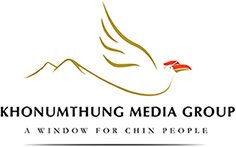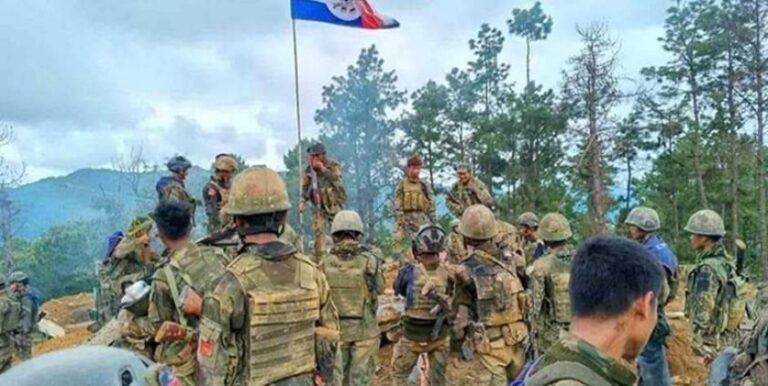The junta leader described the more than four and a half years of rule since the coup as the regime’s first chapter, announcing that a second chapter has now begun. This declaration followed the junta’s move to prolong its grip on power by rebranding the State Administration Council (SAC), the coup regime’s governing body, as a new entity called the National Security and Peace Commission (NSPC).
On July 31, coup leader Senior General Min Aung Hlaing convened a meeting of the National Defense and Security Council (NDSC), where it was decided to dissolve the SAC and establish the NSPC. During the meeting, full authority was formally transferred from SAC leader Min Aung Hlaing to acting president Min Aung Hlaing, the very same person, simply shifting from one role to another.
The NSPC was established under Min Aung Hlaing’s leadership to provide necessary guidance for the successful conduct of the upcoming election, as well as to promote security and peace, the NDSC meeting announced. The NDSC meeting also urged all political parties to make necessary preparations ahead of the junta-orchestrated election scheduled for December.
Salai Htet Ni, spokesperson for the Chin State-based resistance group Chin National Army (CNA) and its political wing, the Chin National Front (CNF), warned that holding elections in Chin State would be impossible for the junta, except in Hakha and Tedim townships, which remain under the coup regime’s control.
“We’ve never recognized the election the junta is planning to hold. We’ve made it clear all along that we won’t accept it because it’s just a one-sided move by the junta to tighten its grip on power. So, in Chin State, the junta will only be able to hold the votes in Hakha and Tedim, at best. On top of that, that election won’t mean anything positive for the Chin people,” the CNF/CNA spokesperson said.
He also warned that if Chin political parties participate in the election, the Chin resistance forces will view it as supporting the junta’s efforts to prolong its rule, and those parties will face the consequences. Meanwhile, the election commission, no more than a junta puppet, claimed it has granted permission to some Chin parties to register and is still vetting other candidates.
The Chin armed resistance forces have vowed to make the entire Chin State a junta-free region by the end of 2025, while the junta is gearing up to hold the election in Chin State.
In the new governing body, the NSPC, Min Aung Hlaing retained his roles as acting president and commander-in-chief, while appointing former general Nyo Saw as prime minister to lead the cabinet.
Chin politician Doctor Hmuh Thang, an SAC member, was also appointed by Min Aung Hlaing as a central advisory member of the NSPC. When the governments of all regions and states were reorganized, the junta reinstated Doctor Vungh Suan Thang, who had served as chief minister of Chin State during the SAC era, to his original position.
Min Aung Hlaing, after appointing himself acting president, declared states of emergency in over 60 towns and townships across the country that have been seized by resistance forces, effectively imposing martial law, including in seven townships controlled by resistance groups. At the NDSC meeting, martial law was declared in seven of Chin State’s nine townships: Mindat, Kanpetlet, Matupi, Paletwa, Falam, Tonzang, and Thantlang, with only Hakha and Tedim remaining exempt.
Salai Htet Ni warned that as the junta aims to hold elections as widely as possible in Chin State, it may carry out new military operations to retake lost territories before the election.
“In my view, the junta’s so-called second chapter won’t have much impact on Chin State. The seven townships put under states of emergency are now basically under martial law. But since the SAC doesn’t even exist anymore, keeping martial law in place just doesn’t make sense. It’s clearly trying to reclaim the territories it has lost, and is likely to launch new offensives ahead of the elections. With its political influence and territorial control in those areas effectively gone, the junta is now likely to rely entirely on military means,” he said.
Salai Htet Ni also criticized the junta’s actions over the more than four and a half years since the coup, saying they have consistently aimed to strengthen the military’s role in Myanmar’s politics, at the cost of driving the country toward becoming a failed state.
“The idea that ‘the military must always have a major role in Myanmar politics’ is at the core of what the junta wants, and that’s exactly what we’re fighting against. The junta will keep doing whatever it thinks it needs to do. That’s no surprise. But these actions won’t bring rule of law or peace to Myanmar. What the junta is really after is its own long-term survival. That’s why we oppose everything it’s doing, because its actions are driving the country toward becoming a failed state,” he said.
A Chin activist urged that Chin resistance forces put aside their differences and focus on confronting their common enemy, the junta. While the junta continues to do what it must, he said, the resistance forces should set aside internal disputes and come together to fight as brothers in arms.
“When we look at the current political and military landscapes in Chin State, it’s clear that although the resistance forces control territories, there’s still a lack of unity among them. It’s time for the leaders to come together for a full and honest discussion on how to address this and rebuild trust. This is not a time for infighting, it’s a time for brothers to stand side by side. So, I urge all Chin resistance forces to make unity a priority and focus on coming together,” he said.


